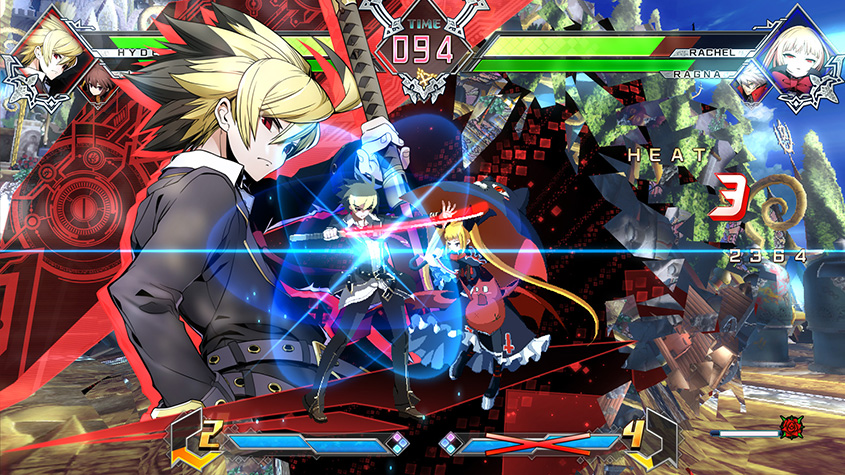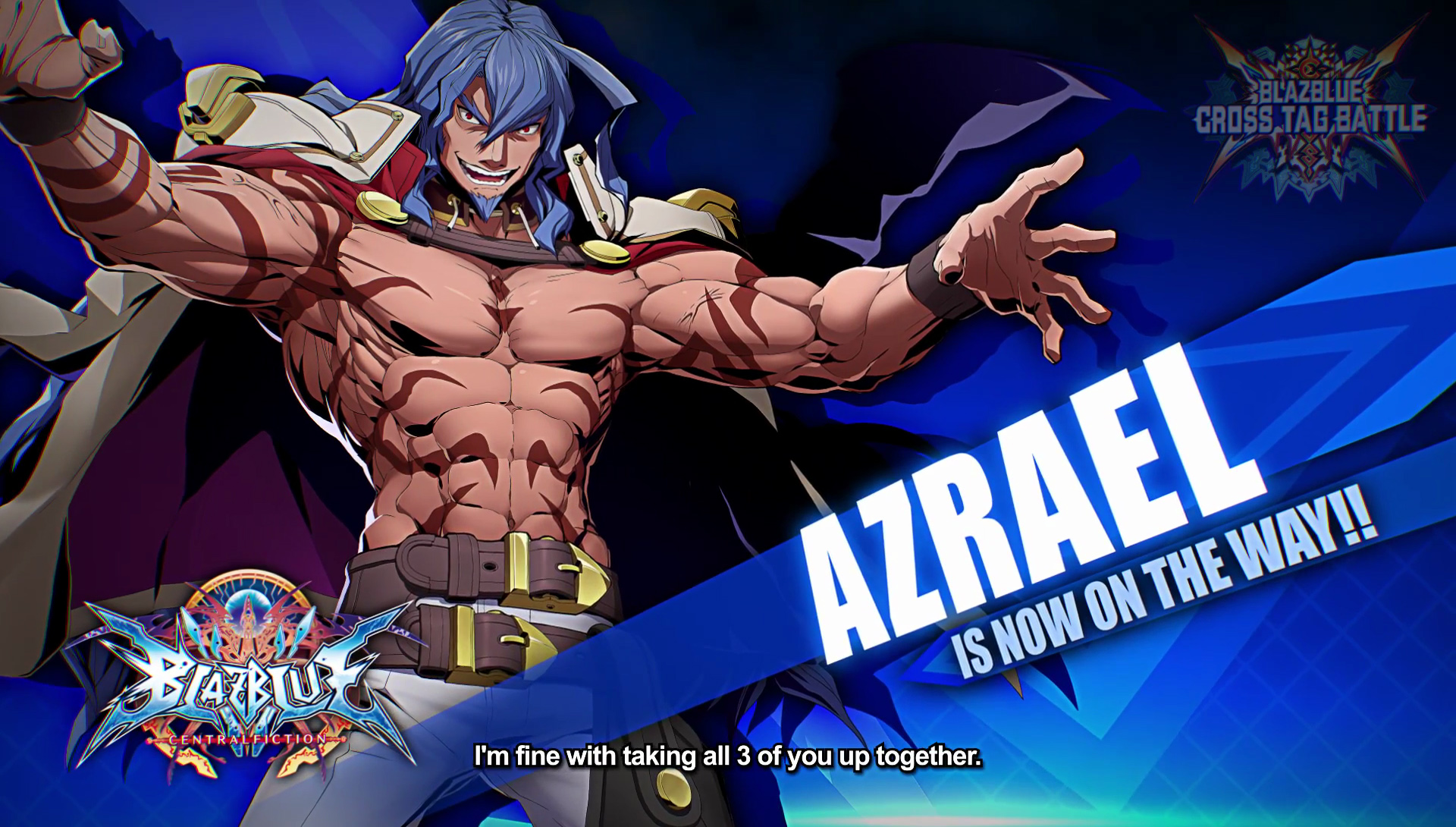Arc System Works talk fighting games on PC, and why none of their male fighters have nipples
An important mystery, solved.

Arc System Works just had its biggest success ever with Dragon Ball FighterZ on PC, a collaboration with Namco Bandai that set the record for the most concurrent fighting game players on PC ever. The upcoming BlazBlue: Cross Tag Battle, landing in June, will be Arc's next attempt to pull in new players who've always been intimidated by the complexity of fighting games, with a simplified control scheme and crossover characters from Persona 4 and Rooster Teeth's RWBY.
I managed to win a match against BlazBlue director Toshimichi Mori, so it's definitely beginner friendly. After a few rounds, I talked with Mori and Guilty Gear creator Daisuke Ishiwatari about where the depth will come from in a tag fighter with simplified inputs and combos, what it's like for Arc System Works to develop games on PC, and, most importantly, why none of the shirtless, beefcake anime dudes in BlazBlue: Cross Tag Battle have nipples.
Wes: I was just starting playing Cross Tag Battle, but it's hard for me to know where the depth will be. I'm curious where the hardcore Arc System Works fans will find the competitive depth and longevity for this game, compared to previous BlazBlue games?
Mori: I think a lot of that will come down to the character combinations. There are a variety of toolkits the players will have access to, depending on which characters they combine with who. One thing we were very careful with is 'if I have this one character on my team I can win.' We didn't want any one character to stick out above the others.
A large concept for the game is to take people from the sidelines of fighting games who are interested in it but have always just spectated because they felt the barrier to entry was too high, or the execution barrier was too much for them, so that the moment you pick up the controller you're able to execute some pretty flashy moves. And the more you dig, the more you discover 'oh wow, this is cool, I can do this.' That's the feeling we wanted to entice in people.
Of course, we are aware that very cartoony, anime-looking visuals like this is considered a niche in the videogame world, but even then, if there's any point at which people might find interest in this game, the fighting, the characters, whatever it is, we want to make this a platform where they can come and play and enjoy it.
We're putting a lot of effort into the network and online modes as well, so we just want this to be, again, a platform where people can interact with each other and build a community around the idea of a fighting game.
The biggest gaming news, reviews and hardware deals
Keep up to date with the most important stories and the best deals, as picked by the PC Gamer team.
That is, again, a large reason why we forced Arc System Works America, so we can start to communicate more directly with our fans and communities, help the communities grow, give them what they need, and listen to their feedback. From there it should trickle onward. Previously I think Japan and Asia had a huge advantage in competitiveness and just information. We want everyone to stand at the same starting line.
Wes: For making the game more approachable to new players, has that affected your training or tutorial modes at all?
Mori: There is of course a tutorial mode that will walk people through the basics of the systems in fighting games, but again going back to it, if you just mash some buttons you'll be able to do something. There's something for everyone here.
A lot of tutorial modes will walk you through all the systems, the complex mechanics, and I don't want any fans to feel like 'oh, I can't enjoy this game unless I master all of these.' I expect some people to not even go into the tutorial, to just dive right into brawling with each other, which is the intent.
Wes: I have kind of a weird question. Where are the guys' nipples? Even Mario has nipples now.
Mori: I heard that overseas it wouldn't be too well received, so we intentionally abstracted that [laughs]. I think in the US and Europe it's more acceptable, but in Asia it's not really… so we kind of fudged it, a little bit. I thought it was totally acceptable to have some form of expression of that. I guess that's cultural.
Wes: It just stuck out to me because last year there were all these jokes about Mario in Mario Odyssey having nipples. Everyone thought it was funny.
Mori: For the record, I am of the school of thought that it's acceptable as a form of expression, but I noticed whenever they'd take some of the artwork that I do with the nipples, in Asia it gets erased.
Ishiwatari: Capcom characters don't have it, either.
Mori: It's a very tedious process to either draw it or not draw it, depending on which region the assets are going to go to, so we just decided to keep it universal.

Wes: How much does Arc System Works share personnel between teams, and technology between BlazBlue and Guilty Gear and Dragon Ball FighterZ, and all your different games?
Ishiwatari: In terms of Dragon Ball FighterZ, that was more of an exception where the lead artist from Guilty Gear was kind of placed at the helm of overseeing many elements of that project. For more games that are developed internally at Arc System Works, exclusively, the game designers talk to each other, so they work really close to each other. Usually at the first stage of any game development, for example, the game designer of Guilty Gear will say 'hey on the next version we're going to try this, add these features and network modes, we got this kind of feedback from the audience, maybe you guys can apply something.' A lot of times at the game designer level they try to communicate, and each project will help the other one grow.
Mori: To summarize and add on to what Daisuke said, we're not a huge company, so I think communication is very key. Because we're not that large, the barrier to reach out to someone across the office is not as big as it might be for a huge, huge studio.
Wes: Is there a lot of shared technology between the different games? The engines that you used, the network infrastructure?
Mori: As far as the network infrastructure is concerned, there is a lot of overlap, but in terms of the engines, anything that has a BlazBlue look, versus a Guilty Gear look, are fundamentally different. Guilty Gear Xrd uses Unreal, where BlazBlue is a self-developed engine we've been modifying and improving upon since the Guilty Gear XX era.
Ishiwatari: Among the games developed inside Arc System Works, there are some universal themes and systems very familiar to people playing any Arc System Works game. So you have your Guilty Gears and BlazBlues and if one tries something new and gets a really good response, generally the other will try to improve upon that, integrate it, and then the barrier to cross between any of our games is generally very low. Of course, there are some exceptions, where one team might disagree with some kind of mechanic or element the other team is really gung-ho about. Those are always up for discussion.
Wes: On the PC, what has it been like for Arc System Works to start bringing their games to Steam? What has the fanbase been like? Has it grown a lot since you started bringing your games to the PC?
Mori: In terms of our PC releases, I think it's still very very young in its development stages. Yes, we have begun to bring games to the PC, but having said that, we haven't noticed any large movement in terms of shift in fanbase or anything of that nature. I think we'll find out in the coming years how that's going to affect that our company structure.

Wes: Is developing for PC still a challenge for the team, or is it as easy now as developing for PS4, arcade?
Mori: In terms of the development on PC, creating a 1:1 clone of any game, it's been pretty standard inside of our team. It's no more or less difficult than developing for any other platform. The biggest challenge right now is making them talk to each other across platforms. That's been a big theme.
Ishiwatari: Each platform has its own quirks and its own fanbase, and we have many micro communities, where if you add everyone together we should have a pretty big community, but it's hard to get everyone matched with everyone else. I think a big bottleneck of fighting games is when you want to play but can't get matched with someone of a similar level. We have five different populations across five different platforms. Of course there's the technological barrier and difficulties of that, as well as the politics.
Wes: How does it feel to have, is it three Arc System Works games that are going to be on the main stage at EVO this year?
Mori: Of course we're very, very thankful. One of the titles being Dragon Ball, it's hard to say how much we really played a role in that, but it's a very heartwarming feeling.
Wes: There's never been another Dragon Ball game on the main stage of EVO, I don't think.
Mori: Our president is saying 10 years from now, I want only Arc games on EVO's main stage [laughs].
On a very personal level, it's a shame Central Fiction wasn't selected to be a main stage title. Going back to my previous point, if we did have Central Fiction, I think the Japanese players would have an advantage, which is not what I'm trying to do for this next era.
Wes: Within Arc System Works, which of your games are most popular in Japan, vs. the West?
Ishiwatari: As far as overseas is concerned, Double Dragon and the Kunio franchise really seem to have a lot of traction and popularity.
Mori: Of course, traditionally this has been a very niche kind of game, and the sort of branding that's been pushed, but with Anime Expo, Comic-Con, you see a lot more Japanese content, and even in US pop culture, what used to be subculture, comics, was always a more nerdy thing, is starting to take the main stage more and more. So I think if we can get people to see, hey, there's a really fun platform to engage upon, then that'll be really good.
Wes: If either of you could make an anime fighter from any series or property, what would you like to adapt?
Ishiwatari: The Simpsons [laughs].
Mori: Family Guy!
Ishiwatari: And Teen Titans is one of my personal favorites.
Mori: Oh, and Powerpuff Girls!

Wes has been covering games and hardware for more than 10 years, first at tech sites like The Wirecutter and Tested before joining the PC Gamer team in 2014. Wes plays a little bit of everything, but he'll always jump at the chance to cover emulation and Japanese games.
When he's not obsessively optimizing and re-optimizing a tangle of conveyor belts in Satisfactory (it's really becoming a problem), he's probably playing a 20-year-old Final Fantasy or some opaque ASCII roguelike. With a focus on writing and editing features, he seeks out personal stories and in-depth histories from the corners of PC gaming and its niche communities. 50% pizza by volume (deep dish, to be specific).

